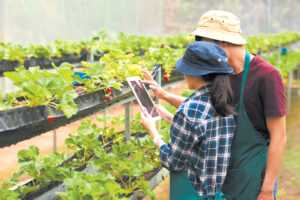PRESIDENT Ferdinand R. Marcos, Jr. said advanced technology will be key to attracting the young to take up careers in agriculture, which he hopes will reverse the ageing trend among farmers.
“Farmers asked me how we can encourage the youth to engage in agriculture,” Mr. Marcos said on Sunday in a video posted on his social media accounts. “My answer is technology. Young people understand new technology.”
The average age of Filipino rice farmers is 56 and climbing, and analysts have predicted a critical shortage of farmers in the next decade as young people show less interest in agriculture, undermining food security.
Among the initiatives cited by Mr. Marcos is the rollout of mobile soil laboratories equipped with state-of-the-art tools aimed at improving farm productivity. He said these facilities will help farmers adapt to soil conditions made worse by climate change.
The chief executive also touted the productivity gains from a rice processing facility capable of handling two to three metric tons of unmilled rice per hour, adding that the continued distribution of farm machinery will ease the burden of fieldwork.
“The government will ensure that everything runs smoothly so that every Filipino family’s dining table will have an abundance of food,” he added. “A reliable supply and nutritious food — these will be the (fruits of) a strong agricultural system.”
Addressing concerns that rice farmers are losing money, he said a minimum buying price is designed to protect farmers.
He noted that the National Food Authority (NFA) buys wet unmilled rice at P18 per kilo and dried rice at P19 to P23 per kilo. “Whatever happens to rice prices, the NFA’s buying price for farmers will not go below this.”
He added that traders often offer farmers low prices because they lack drying facilities.
“That is why we are setting up rice processing plants and hundreds of dryers, so farmers can dry their harvests and choose where to sell their dried palay. They won’t be forced to accept whatever low price traders offer,” he said.
The Philippine Statistics Authority last month reported a 260,000 increase in the number of farm and agricultural workers in April.
Also in April, the number of Filipinos who experienced involuntary hunger at least once in the past three months rose to 20%, according to a Social Weather Stations survey.
This was an uptick from 19.1% in the previous survey conducted April 11–15, which had marked a sharp decline from 27.2% in March. The latest poll was held between April 23 and 28. — Chloe Mari A. Hufana

